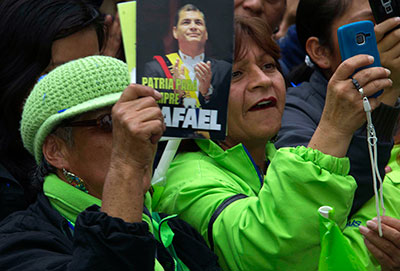
Electoral law dulls reporting as Correa nears re-election
It’s by far the dullest space in the newspaper: Every day in El Universo, Ecuador’s leading daily, readers can find eight small photos and news blurbs summing up the activities of the eight presidential candidates. The articles are the same size and blocked together in a layout that resembles a tic-tac-toe game, minus the ninth…
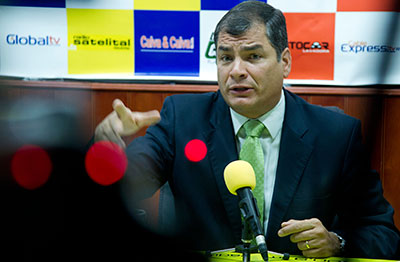
In Correa’s Ecuador, a bulletin on breakfast is routine
On September 11, 2012, the Ecuadoran government interrupted a morning newscast on the Teleamazonas TV station for an official bulletin. What could be so urgent? A coup d’etat? An earthquake? A cholera outbreak? It turned out the government sought to clarify what President Rafael Correa had for breakfast.
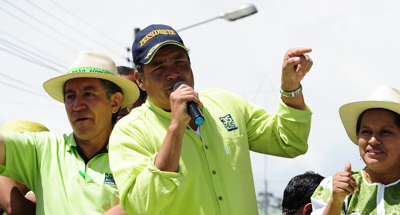
Repression deepens as Correa heads to new term
One result of President Rafael Correa’s high-profile campaign to demonize the country’s private media can be seen on the desk of José Velásquez, news manager at Teleamazonas, a private Quito television station often critical of the government. Among the documents piled high on his desk are lawsuits, which used to be a rare thing. Encouraged by…
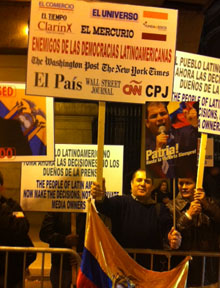
Correa supporters protest as Cabot winners celebrated
The Maria Moors Cabot Prizes, administered by Columbia University Graduate School of Journalism in recognition of journalistic contributions to Inter-American understanding, are the oldest international prizes in journalism. But Josh Friedman, director of the prizes, said this year marked the first time he remembered arriving at the awards ceremony to be greeted by protesters screaming…
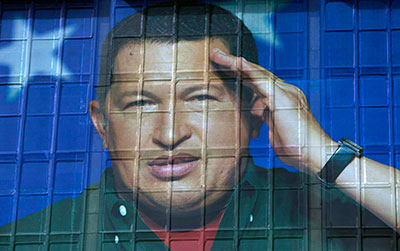
Latin American press faces violence, legal harassment
Violence and legal harassment: the two greatest obstacles to press freedom in Latin America today. That’s the message that CPJ Executive Director Joel Simon is delivering this morning in Washington, D.C., at a briefing hosted by Congressman Sam Farr. Farr, a California Democrat, hosts a monthly series looking at emerging trends in the Western Hemisphere.…

As it backs Assange, Ecuador stifles expression at home
The Quito government’s decision to grant Julian Assange political asylum comes at a time when freedom of expression is under siege in Ecuador. President Rafael Correa’s press freedom record is among the very worst in the Americas, and providing asylum to the WikiLeaks founder won’t change the repressive conditions facing Ecuadoran journalists who want to…
Brazil restates commitment to press freedom, UN plan
CPJ has received an encouraging letter from Ambassador Maria Luiza Ribeiro Viotti, Brazil’s permanent representative to the United Nations, affirming the country’s support for the UNESCO-led U.N. Plan of Action for Security of Journalists and the Issue of Impunity.
Free expression in Americas goes beyond left or right
On Sunday the general assembly of the Organization of American States will convene in Bolivia in the verdant, highland valley city of Cochabamba. The 35 member states (every nation in the region except Cuba) are expected to vote on a measure that, if passed, could curtail free expression and press throughout the hemisphere and put…
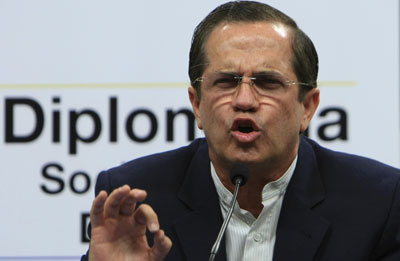
Nations urge Ecuador to guarantee freedom of expression
Stressing concerns of human rights groups about the deterioration of press conditions under the administration of President Rafael Correa, 17 members of the United Nations submitted recommendations to Ecuador on freedom of expression issues before the U.N. Human Rights Council this week. While Ecuador tried to pass off the criticism as resulting from ignorance, the…
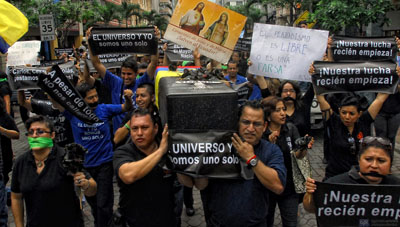
In Ecuador, a crushed and silenced democracy
The sentence against Ecuadoran newspaper El Universo, its opinion editor, Emilio Palacio Urrutia, and its three top executives, Carlos Eduardo Pérez Barriga, César Enrique Pérez Barriga, and Carlos Nicolás Pérez Lapentti, for supposed offenses against Ecuadoran President Rafael Correa in Palacio’s article “NO to lies,” is a worn-out manifestation of the perverse concept of public…